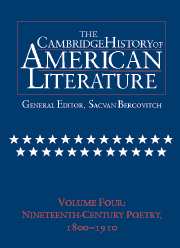Book contents
- Frontmatter
- Introduction
- AMERICAN VERSE TRADITIONS, 1800–1855
- POETRY AND PUBLIC DISCOURSE, 1820–1910
- Preface: the claims of rhetoric
- 1 Modest claims
- 2 Claiming the bible
- 3 Poetic languages
- 4 Plural identities
- 5 Walt Whitman: the office of the poet
- 6 Emily Dickinson: the violence of the imagination
- Chronology, 1800–1910
- Bibliography
- Index
2 - Claiming the bible
from POETRY AND PUBLIC DISCOURSE, 1820–1910
Published online by Cambridge University Press: 28 March 2008
- Frontmatter
- Introduction
- AMERICAN VERSE TRADITIONS, 1800–1855
- POETRY AND PUBLIC DISCOURSE, 1820–1910
- Preface: the claims of rhetoric
- 1 Modest claims
- 2 Claiming the bible
- 3 Poetic languages
- 4 Plural identities
- 5 Walt Whitman: the office of the poet
- 6 Emily Dickinson: the violence of the imagination
- Chronology, 1800–1910
- Bibliography
- Index
Summary
SLAVE SPIRITUALS AND BLACK TYPOLOGY
Although slave-songs reach far back into slave history, the Civil War in many ways marks their birth into national consciousness. Civil division serves as well as a powerful backdrop for interpreting the spirituals, and especially their language and imagery. The music of the spirituals has generally attracted first attention and appreciation. But the texts are no less important registers of cultural forces effecting both the development of a black literary tradition and its place within American culture. While clearly a product of African enslavement in Protestant America, the spirituals present a complex interaction between multiple and crossing impulses: African and white American aesthetic as well as Christian religious forms; sacral and secular functions and meanings; with theological and social/political commitments.
The Bible is central to interpreting these interacting and competing elements, both in the spirituals themselves and in terms of their placement within American culture. Here, two related but distinct issues emerge: the treatment of the Bible within the spirituals, but also the question of access to the Bible by the spiritual singers. In its broadest implications, the spirituals' modes of Biblical engagement dramatize the ways in which interpreting the Bible carries powerful political implications within American culture, involving claims to American identity, even as such claims complicate just what that identity may be.
Many questions remain regarding the history and constitution of the spirituals: their development, their authorships, and establishing the texts themselves, as well as their religious and political implications. Textual analysis of slave spirituals is complicated by their production, transmission, and transcription. The versions which are available often result from painstaking work in collecting and collating variant forms, through such pivotal projects as musical arrangements and performances by the Fiske Jubilee Singers during the 1870s, and into oral histories of former slaves undertaken in the early twentieth century.
- Type
- Chapter
- Information
- The Cambridge History of American Literature , pp. 200 - 247Publisher: Cambridge University PressPrint publication year: 2004



